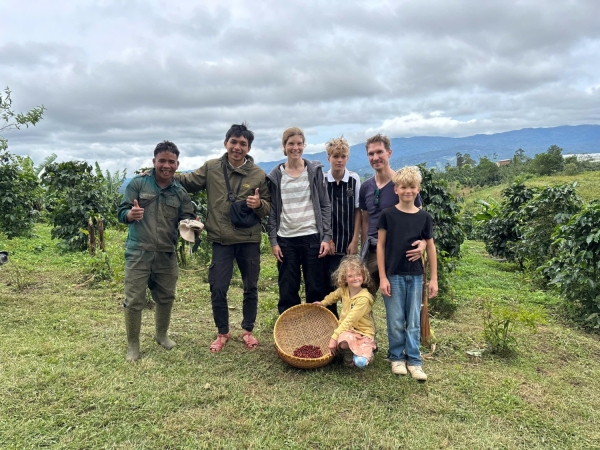
Sustainable agriculture is a widely discussed topic in Vietnam, one I had the privilege of studying at university through site visits to major corporations and smallholder farms. But as insightful as these experiences were, I always had my doubts about the top-down approach to sustainability—where complex realities are often reduced to dry statistics that fail to capture the struggles faced by farmers on the ground.
Determined to bridge the gap between theory and practice, I embarked on an eight-year journey as a smallholder coffee farmer, managing a two-hectare farm dedicated to organic, chemical-free cultivation. The goal wasn’t just sustainability—it was survival. I focused on harvesting only ripe cherries, overseeing quality control, and enhancing the product’s value to ensure financial stability.
However, the challenges quickly became real. Organic farming meant:
✔ Higher labor costs—weeding without herbicides requires more time and effort.
✔ Uncertain markets—buyers often prioritize uniformity over quality.
✔ Lower yields—reducing chemical inputs initially impacted production.
✔ Financial constraints—without external income, reinvestment was difficult.
Despite these hurdles, I remained committed to the long-term vision of sustainable coffee—one that prioritizes quality, biodiversity, and farmer resilience.

Through these hands-on experiences, I was invited as a guest participant at RECOFTC’s first technical meeting on sustainable coffee farming in Lát Commune, Da Lat. The forum gathered government experts, NGOs, cooperatives, and farmers, all striving to transition toward lower chemical use, biodiversity protection, and integrated agroforestry models.
More than just discussions, I had the opportunity to visit farms, share experiences, and demonstrate practical coffee-growing techniques alongside farmers with over 20 years of organic coffee experience. These moments reinforced a crucial truth—sustainability isn't just about environmental impact; it’s about ensuring farmers can thrive economically.


Common concerns from local farmers included:
🌱 How to fertilize organically without reducing yields?
💧 Water management in sustainable coffee production.
🐛 Strategies for pest control without synthetic pesticides.
🌾 Transitioning older coffee plants into organic systems.
The depth of these concerns underscored the complexity of sustainable farming—it’s not a simple shift, but a continuous adaptation.

As both a farmer and a business owner, I understand the importance of market accessibility. Growing premium organic coffee without a viable market only leads to failure. If organic farmers sell to instant coffee producers, sustainability efforts will collapse under pricing pressures.
At HuyEco, my goal is to bridge this gap, offering:
✔ A specialty coffee shop—where ethical sourcing is respected, and farmers receive fair compensation.
✔ Farm-to-cup experiences—allowing consumers to visit coffee farms, meet growers, and understand the process behind their coffee.
✔ Curated sustainable coffee tours—giving visitors the chance to experience the delicate balance between agriculture and environmental preservation in Vietnam.

After the RECOFTC meeting, I initiated discussions with local farmers and organizations to integrate sustainable coffee production into HuyEco’s sourcing standards, ensuring a consistent market for quality-focused growers.
🚀 What’s next?
✔ Supporting farmers in refining organic techniques while maintaining financial stability.
✔ Expanding farm-to-consumer relationships to strengthen market access.
✔ Promoting ethical coffee tourism—creating an experience where visitors don’t just drink coffee but engage with its origins.
If you're passionate about sustainable coffee and responsible tourism, I invite you to HuyEco—where sustainability is more than a concept; it’s a lived experience.
📅 Discover more:
🔗 Book a coffee tour
🔗 Visit HuyEco Café
🔗 Explore farm-to-cup sustainability
Together, we can build a coffee culture that supports both farmers and the environment.

👉 Sustainable Coffee & Farmer Empowerment
From hands-on farming to building a clean, traceable coffee supply chain.
👉 Farm-to-Cup Coffee Tour in Vietnam
Half-day experience: pick ripe cherries, roast, brew, and connect with farmers.
👉 Visit HuyEco Café in Da Lat
Enjoy clean, defect-free coffee brewed to match your style.
👉 Order Premium Coffee Beans
Arabica, Robusta, and Liberica—hand-picked, clean-processed, traceable.
👉 Hope, Challenges & Organic Coffee – A Young Farmer’s Journey
A personal story of starting sustainable farming in the Mekong region.
👉 Sustainable Food Systems – Lessons from Meatha Organic
How integrated farming models prevent market instability and support resilience.
👉 RECOFTC – Advancing Community Forestry & Sustainable Agriculture
Regional leader in community-based natural resource management.
👉 Specialty Coffee Association – Coffee Standards
Global authority on specialty coffee grading, processing, and sustainability.
👉 World Coffee Research – Coffee & Climate
Research on coffee genetics, climate resilience, and farmer support.
👉 Rainforest Alliance – Sustainable Coffee Certifications
Standards for traceability, clean processing, and ethical sourcing.
Reader Comments
Newer articles
 Sustainable Coffee & Local Culture Tour in Da Lat — Arabica, Robusta & Ethical Farming
Sustainable Coffee & Local Culture Tour in Da Lat — Arabica, Robusta & Ethical Farming
 Discover Sustainable Coffee in Da Lat — A Farm-to-Cup Journey with HuyEco
Discover Sustainable Coffee in Da Lat — A Farm-to-Cup Journey with HuyEco
 Sustainable Coffee and Local Farming Realities in Da Lat HuyEc
Sustainable Coffee and Local Farming Realities in Da Lat HuyEc
 From Forest to Cup: A Personal Journey into Sustainable Coffee in Da Lat
From Forest to Cup: A Personal Journey into Sustainable Coffee in Da Lat
 Inside HuyEco: How a Coffee Huller Machine Transformed Our Coffee Production
Inside HuyEco: How a Coffee Huller Machine Transformed Our Coffee Production
 From Forest to Cup: A Farmer’s Vision for Sustainable Coffee and Local Travel in Da Lat
From Forest to Cup: A Farmer’s Vision for Sustainable Coffee and Local Travel in Da Lat
 Field Notes from Xã Lát: Rooted in Regenerative Coffee & Indigenous Farming
Field Notes from Xã Lát: Rooted in Regenerative Coffee & Indigenous Farming
 Đưng K'Nớ: Brewing Sustainable Coffee in Vietnam’s Highland Forest
Đưng K'Nớ: Brewing Sustainable Coffee in Vietnam’s Highland Forest
 Living Coffee Ecosystem in Da Lat – HuyEco’s Way of Growing
Living Coffee Ecosystem in Da Lat – HuyEco’s Way of Growing
 Nel Drip & Wabi-Sabi: Japanese Coffee Rituals at HuyEco Da Lat
Nel Drip & Wabi-Sabi: Japanese Coffee Rituals at HuyEco Da Lat